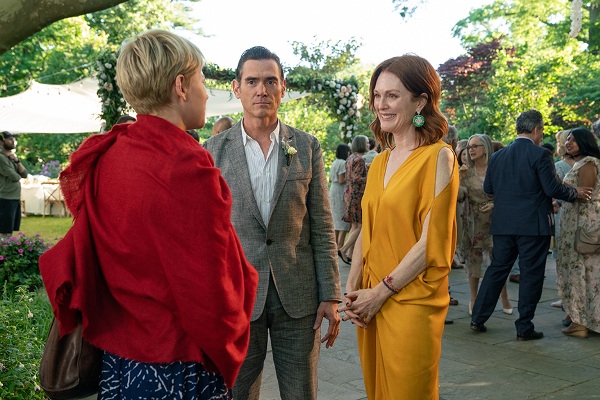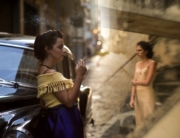
From left, Michelle Williams, Billy Crudup, and Julianne Moore in After the Wedding (David Giesbrecht/Sony Pictures Classics)
More than a decade later, writer/director Bart Freundlich—producing with wife Julianne Moore—has adapted the Academy Award–nominated film by Susanne Bier, the Danish After the Wedding (2006), as a vehicle for Moore to play a contemporary woman-in-charge. He has switched the genders of Bier’s three main characters and changed continents, so it feels a bit updated.
Theresa Young seems to have it all. Very much a one percenter, she runs her own media marketing firm from a Manhattan skyscraper and is negotiating her biggest deal yet. She’s even happy at home, with her twin eight-year-old sons and artist husband Oscar Carlson (Billy Crudup) busy at work in his studio. Her Oyster Bay, Long Island, estate looks as if the beautiful grounds were designed by a devoted horticulturalist. (In real life, it’s the property of the late garden writer Suzanne Bales.) It’s the perfect site for the wedding of her 21-year-old daughter Grace (Abby Quinn) to her handsome junior executive Jonathan (Alex Esola).
But first, the film opens with Isabel (Michelle Williams), in the Mads Mikkelsen role of the original film, providing some kind of vague help to a bare, crowded orphanage in the city of Karaikudi, India. The manager, Preena (Anjula Bedi), is grateful for Isabel’s assistance with fund-raising efforts, but a potential large foundation grant comes with a catch Isabel finds quite annoying. She will have to leave the children, especially the cute little boy she happily dotes on, to meet with the foundation head in New York City.
Upon arrival, Isabel is surprised to be picked up by a limo and embarrassed by the luxury boutique hotel the foundation has booked for her to stay. She keeps thinking what this expenditure could buy for the orphanage instead. She becomes even more frustrated when she barely gets to make her pitch before the foundation head, who insists Isabel come to her daughter’s wedding.
Once this manipulative set-up is realized, much of the rest of the movie is full of recriminations and dredged-up emotions that seem a Stella Dallas-like woman’s film for today. What saves it from cloying melodrama is the heartfelt anguish seeping through the grown-up dialogue spoken by fine actors, and the gorgeous buildings and scenery as photographed by cinematographer Julio Macat.
















Leave A Comment